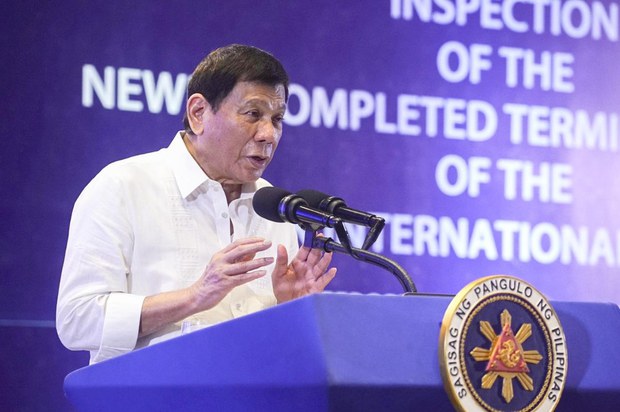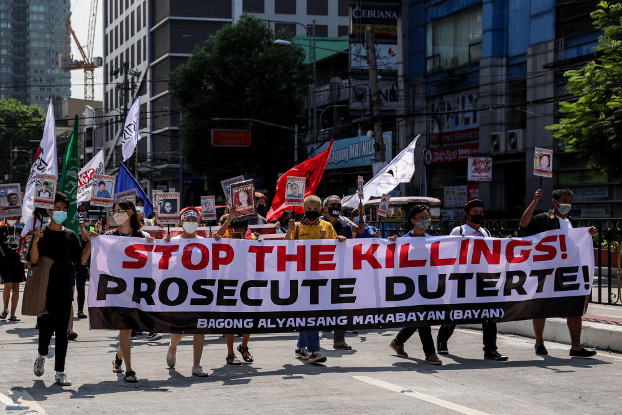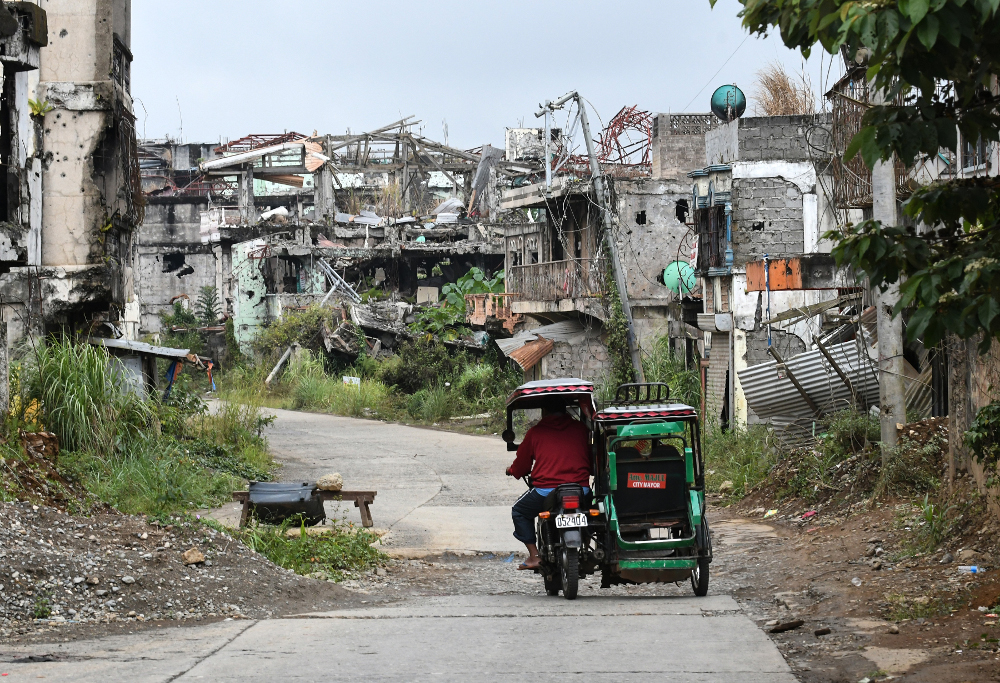Philippine Leader Looks to Cement Legacy in Final State of Nation Speech
2021.07.23
Manila
 Philippine President Rodrigo Duterte speaks during an event marking the completion of the passenger terminal at Clark International Airport in Pampanga province, north of Manila, July 17, 2021.
Philippine President Rodrigo Duterte speaks during an event marking the completion of the passenger terminal at Clark International Airport in Pampanga province, north of Manila, July 17, 2021.
Philippine President Rodrigo Duterte will attempt to cement his legacy in his sixth and final State of the Nation Address on Monday, his spokesman said, but analysts countered that the commander-in-chief would be remembered for two major failures.
Duterte failed in his promise to end the scourge of drugs despite thousands of extrajudicial killings of suspected peddlers and addicts carried out through his administration’s counter-narcotics crackdown, and his government capitulated to Beijing over the South China Sea issue, two analysts told BenarNews in commenting on the president’s legacy. His six-year term ends in 2022.
Duterte’s speech to a joint session of Congress will be less about politics and more about reflecting on his achievements and presenting a roadmap for his last year in office, presidential spokesman Harry Roque said.
“He will look back at the five years that have passed since he was president. He will focus on, of course, the country’s progress, our social programs, infrastructure, peace and security, foreign policy,” Roque told reporters earlier this week.
“He will answer the questions, ‘What and where we are now?’”
The spokesman also expected Duterte to call on lawmakers to push certain measures as priorities, including a tax-reform package and amendments to the country’s Retail Trade Liberalization Act.
This year’s address is likely to be muted compared with previous ones, because health officials have limited the expected number of guests to around 350 inside the House chamber due to the COVID-19 pandemic. About 15,000 police officers will be assigned to guard duty because opposition groups are expected to protest the address.
Richard Javad Heydarian, a political analyst, said he did not see Monday’s address as a “farewell speech” from Duterte, but rather as a platform instead to promote his proxies for next year’s presidential elections, which his daughter, Sara Duterte, may contest. Constitutional limits restrict presidents to a single six-year term.
“So it is less about defending his legacy, than perpetuating his regime ahead of what’s looking like a very contentious elections,” Heydarian, author of “The Rise of Duterte against Elite Democracy,” told BenarNews.
Drug war
Jose Antonio Custodio, a historian and political analyst at the Institute of Policy, Strategy and Development Studies, said Duterte would not have a legacy at the end of his term.
“If there was one thing that he has achieved, it is to turn the country into a mess and the basket case of Southeast Asia,” Custodio said, referring to Duterte’s war on drugs, a campaign launched shortly after he took office in 2016.
Custodio and Heydarian both believe the drug war has been a failure.
“His chief policy, the drug war, has been an absolute travesty, failing to produce any empirically, verifiable improvement on the ground,” Heydarian said.
“It has created untold human tragedy, tarnished the country’s image and global position as a traditional beacon of democracy in Asia, and estranged major investors seeking rule of law.”
Duterte, 76, who is known for his brash and foul-mouthed style of leadership, captured the imagination of a public tired of runaway crime and politics cornered by the powerful elite, when he campaigned for the presidency five years ago. He vowed then to break monopolies, as well as “dump the bodies” of drug dealers and traffickers killed by police in Manila Bay.
According to the government, the Duterte administration’s drug war has claimed the lives of 8,000 alleged drug addicts and dealers, but human rights groups say that the figure could easily be three times higher.
Facing prosecution at the International Criminal Court over these so-called extrajudicial drug killings, Duterte in 2019 pulled the Philippines out of the treaty that created the body.
But on Wednesday, the Philippine Supreme Court released a ruling saying that he could face trial at the ICC in The Hague for crimes committed before the country’s withdrawal.
“I expect more dismissive rhetoric on the ICC which will further implicate him in crimes against humanity,” Custodio said.
“At the end of the day, after five long years of this scoundrel, we all know one thing by now – and this is that he lies.”

South China Sea
The analysts also said that Duterte’s pro-China policy had failed to yield any major South China Sea improvements for the Philippines.
On July 12, 2016, the Permanent Court of Arbitration in The Hague affirmed the Philippines’ rights to its territories under the United Nations Convention on the Law of the Sea (UNCLOS), and declared China’s claim over most of the South China Sea as baseless.
Instead of leveraging the award, Duterte ignored the verdict and pursued friendlier ties with China. Meanwhile, Beijing’s pledges of U.S. $24 billion in economic assistance for infrastructure projects have yet to materialize.
“Nothing came out of this government’s appeasement policy on China,” Renato de Castro, professor of international studies at the De La Salle University in Manila, told Benar News earlier this month, ahead of the fifth anniversary of the historic legal victory by the Philippines against China.
“We got no concessions from China whatsoever.”
Duterte could have spent the last five years making the rounds of international forums such as the U.N. General Assembly and the Association of Southeast Asian Nations (ASEAN) to get the world’s naval powers to assist in implementing the South China Sea ruling, de Castro and other analysts said.
Now, with less than a year left in Duterte’s term, his administration is facing increased scrutiny of the government’s achievements and failures, Heydarian said.
“My sense is Duterte is more vulnerable at this point. And his rivals will likely tap into anti-China sentiments, even more so as we head into the polls,” he said.

Marawi
Meanwhile, Duterte’s government has had some success against militants linked to the Islamic State who laid siege to the southern city of Marawi for five months in 2017, precipitating a battle with government forces that left it in ruins.
But the Duterte administration so far has failed on its promise to fully rehabilitate the city, said Drieza Lininding, head of the Moro Consensus Group, a civic organization leading the calls to speed up Marawi’s reconstruction.
Lininding called on Duterte to certify the Marawi Compensation Bill which seeks to set aside funds of up to 50 billion pesos (nearly U.S. $1 billion) for those who lost their homes in Marawi.
“Until now we cannot go back inside Marawi City,” Lininding said.
“Some officials have been telling us to support [Duterte’s] daughter’s journey to the presidency. It only means the rehabilitation of Marawi will not be finished during his time. It has not yet even started.”







